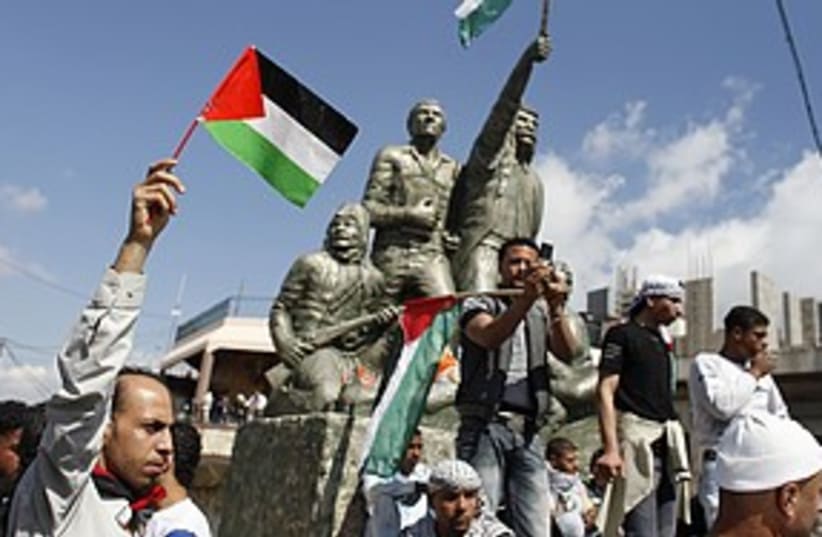RELATED:Nakba Day protesters return from Syria to Majdal ShamsPolice arrest Syrian infiltrator near Majdal ShamsOn Monday the spectacle was new: A few dozen Israeli troops repairing the fence breached the day before, when around 100 Syrians – many of Palestinian origin – suddenly charged the border separating Syria and the Golan.In the distance, a handful of Syrian security forces watched the goings-on from an army lookout point boasting a giant portrait of President Bashar Assad surrounded by Syria’s tricolor flags.Hamad Awidat, 27, is a television producer and curator of the “Museum of the Occupied Syrian Golan Heights,” which opened last year to showcase Druse heritage in the Golan. That heritage, he’s quick to point out, is an inseparable part of Syria’s own.“A historic day,” he said proudly, sitting in his office near one of the village’s two statues of Sultan al-Atrash, the Druse military leader who fought to free Syria from Ottoman, and later French, control.“The people here threw rice” at the infiltrators, he said. “Everyone here was in favor of what they did.”Awidat rejects any insinuation that the Golan’s Druse – few of whom have taken Israeli citizenship, and most of whom travel abroad with laissez-passer documents – suffer from identity issues.“Our situation is easy as pie,” he said. “We know who we are. We’re Syrian Arabs.The situation today in the Golan – everything you see around you – we did it, not Israel.”Awidat said he had no problem with his Israeli co-religionists who serve in the IDF. “They believe Israel is their nation, and I believe Syria is mine,” he said.Among most in Majdal Shams, support for the institution of Syria’s government is unconditional – but doubts persist over whether its current president may have overstayed his welcome.“Bashar Assad I don’t like, personally,” said one man in English. “You can’t stay in power for 40 years,” he said, referring to the Assad dynasty, begun by the current president’s father. “We need new blood.”Recently returned from nearly 20 years in South Africa, the man said Israel refused to grant him either residency papers or citizenship. Despite the slight, he insists he admires Israel’s democracy.
For Golan Druse, ties to Syria are nonnegotiable
The Syrian identity of Majdal Shams residents is unambiguous, even if feelings toward Assad are not.

RELATED:Nakba Day protesters return from Syria to Majdal ShamsPolice arrest Syrian infiltrator near Majdal ShamsOn Monday the spectacle was new: A few dozen Israeli troops repairing the fence breached the day before, when around 100 Syrians – many of Palestinian origin – suddenly charged the border separating Syria and the Golan.In the distance, a handful of Syrian security forces watched the goings-on from an army lookout point boasting a giant portrait of President Bashar Assad surrounded by Syria’s tricolor flags.Hamad Awidat, 27, is a television producer and curator of the “Museum of the Occupied Syrian Golan Heights,” which opened last year to showcase Druse heritage in the Golan. That heritage, he’s quick to point out, is an inseparable part of Syria’s own.“A historic day,” he said proudly, sitting in his office near one of the village’s two statues of Sultan al-Atrash, the Druse military leader who fought to free Syria from Ottoman, and later French, control.“The people here threw rice” at the infiltrators, he said. “Everyone here was in favor of what they did.”Awidat rejects any insinuation that the Golan’s Druse – few of whom have taken Israeli citizenship, and most of whom travel abroad with laissez-passer documents – suffer from identity issues.“Our situation is easy as pie,” he said. “We know who we are. We’re Syrian Arabs.The situation today in the Golan – everything you see around you – we did it, not Israel.”Awidat said he had no problem with his Israeli co-religionists who serve in the IDF. “They believe Israel is their nation, and I believe Syria is mine,” he said.Among most in Majdal Shams, support for the institution of Syria’s government is unconditional – but doubts persist over whether its current president may have overstayed his welcome.“Bashar Assad I don’t like, personally,” said one man in English. “You can’t stay in power for 40 years,” he said, referring to the Assad dynasty, begun by the current president’s father. “We need new blood.”Recently returned from nearly 20 years in South Africa, the man said Israel refused to grant him either residency papers or citizenship. Despite the slight, he insists he admires Israel’s democracy.